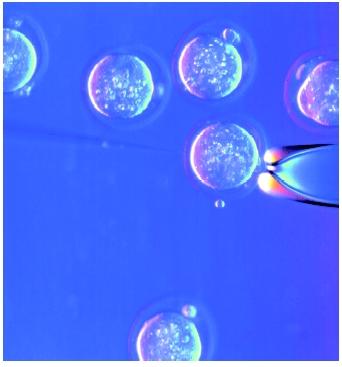By Joseph Candel

Reports of breakthroughs in cloning are becoming more frequent in the news. Along with a sense of wonder at what science is now capable of, those reports also raise complex and troubling questions. Is cloning within acceptable moral and ethical bounds? Could the benefits ever outweigh the risks?the ends justify the means? How would cloning change what it means to be a human being? What does God think about all this?
Defining the cloning debate
The term ?cloning? is widely used in science, and simply means making a copy of something. A scientist who makes a copy of a strand of DNA, for example, would describe that as cloning. There is nothing morally problematic about that. The controversy is over the reproduction of advanced life forms through cloning, and especially research aimed at eventually cloning humans.
The cloning process
Cloning of humans would sidestep the traditional process of reproduction in which the male sperm fertilizes the female egg. Instead, it would create a person from an embryo by transplanting the DNA-containing nucleus of a cell from either a man or woman into a woman?s egg from which the nucleus has been removed. So instead of producing a child whose DNA makeup is a composite of his or her parents?, the clone?s DNA would be?at least in theory?an identical copy of the ?original.? (In theory, because attempts to clone animals have so far shown a very high incidence of abnormalities.)
Cloning milestones to date
February 24, 1997: Scientists at Scotland?s Roslin Institute announce successful reproduction of a sheep named Dolly using DNA from a single adult sheep cell.
July 1997: The British scientists who made Dolly clone Polly the lamb, who carries human genes. They hope to clone herds of identical sheep that can produce human proteins for medical use.
December 1997: Science magazine proclaims the cloning of Dolly the leading scientific advance of the year.
February 2002: Japanese researchers who cloned a dozen mice report that virtually all the animals died early, casting doubts on the safety of cloning. The same month, scientists report that cloned mice have become obese.
February 2002: Scientists at U.S. Texas A&M University say they cloned a house cat and present a two-month-old kitten they call cc, short for carbon copy.
May 2002: A U.S. fertility expert, Panayiotis Zavos, tells a congressional panel that ?2002 will be the year of the clones? and says he is working to clone a human later in the year. He urges Congress to keep cloning legal so it can be regulated.
February 14, 2003: Six-year-old Dolly is euthanized after suffering from advanced lung disease usually seen in animals twice her age.
What the headlines don?t tell us
Despite attention-grabbing headlines and photographs of Dolly the sheep and cloned cows, pigs, goats, and mice, a high percentage of animal clones are stillborn with monstrous abnormalities. Since cloned fetuses are commonly twice the size of normal ones, bloated mothers often have laborious miscarriages and occasionally die themselves. Most clones that survive at birth die before reaching maturity, or develop serious health problems later in life. (Dolly the sheep suffered from severe arthritis, which may or may not have been a result of her being a clone, and was euthanized in February 2003 due to progressive lung disease.) There?s no reason to believe that similar problems will not arise in the cloning of a human child.
Three biblical perspectives
Some things we don?t need to know. In the very beginning, Satan tempted Eve in the Garden of Eden, saying, ?If you eat the fruit of the Tree of the Knowledge of Good and Evil, you will be like gods!? (Genesis 3:1-6). To this day, that is still one of Satan?s most frequent and effective temptations. Science is sitting at the foot of the Tree of the Knowledge of Good and Evil, plucking fruit. The trouble is, some of that fruit is good and some is bad, some is beneficial and some is diabolically harmful.
Just as the technological advances of the past few decades have brought us closer to the brink of self-destruction with ?bigger and better? bombs, missiles, and other weapons of war, advances in the fields of genetic engineering and cloning are a two-edged sword: One edge promises better quality of life, but the other edge creates problems that neither science nor society is prepared to deal with.
Life and the Life-giver: ?God created man in His own image? (Genesis 1:27). In essence, proponents of cloning want to usurp God?s role and become creators and gods themselves, making offspring in their own images. We were created to love and respect our Creator, not to attempt to be creators ourselves. Those who would clone other humans are meddling in God?s business, but without His power and love. To think that they can improve on His design or plan is the ultimate in arrogance and audacity.
?God formed man ? and breathed into his nostrils the breath of life; and man became a living soul? (Genesis 2:7 KJV). Only God has the right to create a new human soul, and only God has the power to grant eternal life. Life comes only from the Life-giver, and eternal life comes only through receiving Jesus as our Savior, not through attempts to immortalize ourselves by duplicating ourselves (John 3:16; 1:12, Revelation 3:20).
The Endtime connection: The Bible says that ?in the Last Days perilous times shall come,? and that ?evil men and seducers shall wax worse and worse, deceiving, and being deceived? ? ?ever learning, and never able to come to the knowledge of the truth? (2 Timothy 3:1,13,7 KJV). Each advance in cloning science takes us one step closer to becoming little gods and another step away from the truth of God. u
[Callout:] Genetic engineering and cloning are a two-edged sword: One edge promises better quality of life, but the other edge creates problems that neither science nor society is prepared to deal with.


